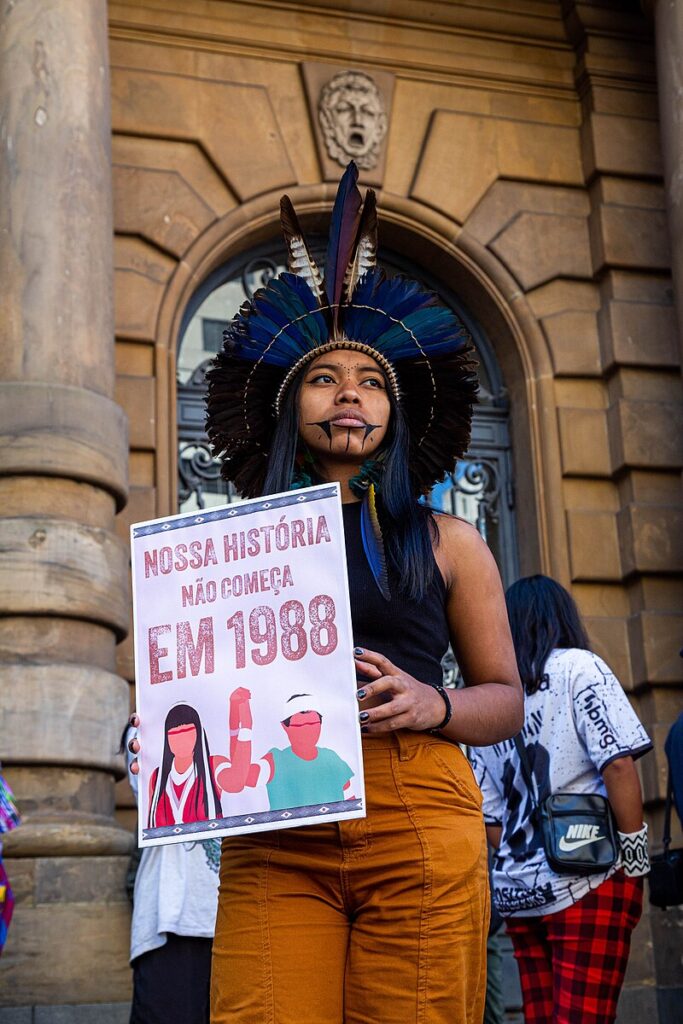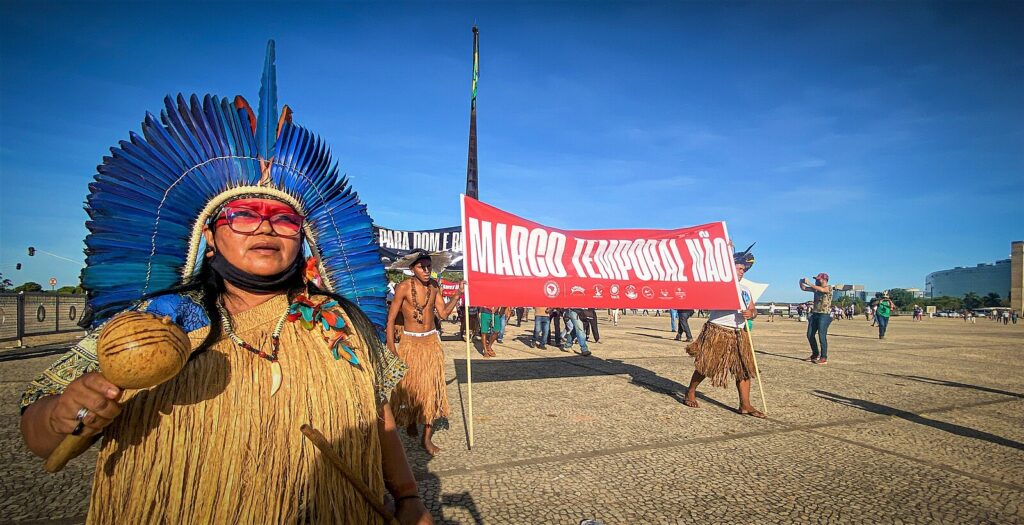In July, we published a story on the Marco Temporal thesis, a political argument that was first articulated among the 19 conditions of the Raposa-Serra do Sol judgement in 2009 in the Supreme Court of Brazil. These conditions, called “institutional safeguards“, gave Brazilian states the right to be involved in the demarcation process of Indigenous territories.
The discussion of Marco Temporal relates to Indigenous Rights to land, as referenced within the Constitution of the Federative Republic of Brazil, and specifically the land they “traditionally occupy”. The Raposa-Serra do Sol judgement arose from the tensions between the different perceptions of the territory of Raposa-Serra do Sol — between Indigenous Peoples, rice producers, farmers and miners, as well as the State and Federal Governments — and this necessitated a specific articulation of the Rights of Indigenous Peoples, and the laws that uphold them. The thesis can be found in the judgement, and is articulated in full in our aforementioned story.

The Marco Temporal thesis is a shift from the belief that the Rights of Indigenous Peoples predate the conception of the Brazilian State, fixing the date of occupation to the Constitution. Unfortunately the attempt to create clarity generated doubt and confusion around the demarcation of Indigenous territories in Brazil, exemplified by a dispute over the Ibirama-Laklãnõ Indigenous Territory between the National Foundation for Indigenous Peoples (FUNAI) and the Foundation for Technological Support to the Environment (FATMA) in Santa Catarina, which led to another case in the Supreme Court in 2016. This case had a “general repercussion” unanimously recognised by the Supreme Court on April 11 2019, meaning its judgement — referred to as Extraordinary Appeal 1,017,365 — would act as a precedent for all cases involving the demarcation of Indigenous territories at all levels of the Brazilian judicial system.
The development of this case occurred alongside the progression of Bill (PL) 490/2007. The Bill, filed by the Federal Deputy of Mato Grasso Homero Pereira in 2007, was archived and unarchived three times until June 23 2021, when PL 490 was approved by the Constitution and Justice Committee and moved into the Chamber of Deputies, the lower house of the Federal Congress. The political process of PL 490 is connected to the legislative process of Marco Temporal, as both seek to change the legal interpretation of the Constitution, specifically the rules for demarcating Indigenous territories. The Bill’s reintroduction meant there were simultaneous processes focused on Indigenous territories in both the legislative and political systems of Brazil.
On September 9 2021, the Federal Supreme Court began its judgement of Extraordinary Appeal 1,017,365. Minister Edson Fachin, Rapporteur of the process, voted against Marco Temporal and the definition of the Raposa-Serra do Sol judgement, and its conditions, as precedent for future demarcations of Indigenous territories. The case adjourned for a week, recommencing on September 15 2021, when Minister Nunes Marques voted in favour of Marco Temporal. Minister Alexandre de Moraes was next to vote and asked to see the case records, once again delaying the process until June 7 2023, when he voted against the Marco Temporal thesis before proceedings were again halted, this time by Justice André Mendonça. This occurred a week after the Chamber of Deputies approved PL 490 on May 24, which led to a vote in the Federal Congress on May 30, with the Bill passing 283 votes to 155. The Bill thus entered into the Senate, where it was given a new number, PL 2903.
On August 30, the voting on Extraordinary Appeal 1,017,365 resumed in Brazil’s Supreme Court and André Mendonça voted in favour of Marco Temporal. The following day, Cristiano Zanin and Luís Roberto Barroso voted against, before the session was adjourned. Proceedings recommenced on September 20 and by the following morning, the remaining five judges had voted and the Marco Temporal thesis was finally declared unconstitutional, with nine judges against and two in favour.

Unfortunately this victory for Indigenous Peoples was short-lived, as the Federal Senate approved PL 2903 on September 27, with 43 votes in favour and 21 against. PL 2903 will uphold the vision of Marco Temporal for the demarcation of Indigenous territories by transferring the authority for land demarcation from Executive Power (or the President) to the legislative system. It will also allow any person to question demarcation procedures in any phase of the process, including those already approved; the construction of state infrastructure inside Indigenous territories without free, prior and informed consultation with the affected community; and will recognise the legitimacy of titles, possessions and domains taking place over traditional territories, thus increasing the possibility of land grabbing.
Since its approval, PL 2903 is in the hands of President Luis Inácio Lula da Silva who has 15 business days from the publication of the bill to decide on its approval or veto. Independent Senator Randolfe Rodrigues, emphasised the unconstitutionality of the bill, speaking of a possible pathway towards the rejection of PL 2903: “the text should be vetoed by President Lula. Even if the Nacional Congress overrides the presidential veto, the Supremo Tribunal Federal (STF) will be convened again. That is why the Supreme Court exists, to be called upon when the Constitution is not respected.”
The Articulation of Indigenous Peoples of Brazil (APIB) has also called on President Lula to veto PL 2903, and Célia Xakriabá, Member of Brazil’s Federal Congress, initiated a petition to put pressure on the President. We stand with them with the hope that President Lula makes the necessary decision to veto PL 2903, to protect the environment and the Rights of the Indigenous Peoples of Brazil.
Anton Rivette is a writer and photographer. He leads storytelling at eco-nnect.













